We were
told we could set our alarms for 4am and watch the sail into Stockholm past
some of the 30 000 islands in the archipelago – or see them as we sailed out.
We did not set the alarm but I did do some typing on the balcony at about 6.30am
and got a few photos then.
We had
been unsure if we would go to the Vasa museum but the name did ring some bells
and I had been able to do enough of a check to make it our first stop. I had
even got some local currency in case it was needed for public transport, but
that proved totally unnecessary.
We were
able to walk about 300m to get the ferry, and one was just about to leave. We
got and all day ticket and within 10 minutes we were at the museum. I thought
it opened at 9am and it was earlier than that so we wandered around the
building then spotted it opened at 8.30am. As we have pins on our credit card there
was a machine that did our tickets and hence no waiting at all in queues. We
were in well before any cruise ship tours as well.
The Vasa
Museum is a maritime museum on the island
of Djurgården.
The museum displays the only
almost fully intact 17th century ship that has ever been salvaged. The 64-gun
warship sank on her maiden voyage in 1628.
The Vasa Museum opened in 1990 and we were told that it is the most visited
museum in Scandinavia. We could also have
visited 4 other museum ships which were moored outside. We were told it is a
one to two-hour visit but did not expect to need that long. In fact we were
there for nearly two hours.
The wreck
was salvaged in 1961 after being under water for 333 years. Because the water
here is not really salty, it did not rot as it would have in normal sea water.
This means the reconstructed ship is actually 98% original. The new pieces have
been left untreated so they stand out as paler against the original ship. It
was also adorned with hundreds of carved statues. The paint has long gone, but
the adornments were in very good condition.
The main
thing you see as you enter is the ship which fills most of the hall. The
building has a number of floors and from these you also got closer views of the
ship.
The main level also has a fully rigged 1-10 model of the ship. At various
points there were also replicas of the carvings repainted in what are believed
to be the colours of the day.
The
statues were often significant. The Swedish coat of arms features also.
There
were displays relating to life on board. One sign said that in 1628 the King
decreed that the navy should be provided with abundant beer and bread. Fresh
water went bad and salt water had been substituted at time. Beer without hops
went sour, but was safer. Peas, meat and dried fish were other staples. The
body was believed at the time to consist of 4 ‘humours’ which needed to be in
balance. The barber was responsible for restoring the balance using enema,
bleeding and salves. Most people who died on 17the century ships died of
illness and not in battle.
There was
what seemed like a rather random display about the role of women in business at
this time. Many businesses were run by couples and If a woman was widowed she
could continue her husband’s business. The reason for the display became
apparent. The shipyard where the Vasa was built was being run by a woman when
the ship was launched. Her husband had designed the ship and ran the shipyard
but had died before it was finished.
There was
a scene with 4 figures showing the King, Admiral, the shipwrights widow and her
partner all meeting when the King came to visit the soon to be completed ship.
The King was impatient to see the ship completed and also wanted extra cannons
on board.
He wrote that there would be “His Royal Majesty’s Disfavour’ if it
was not complete by July 25. On the afternoon of August 10 1628 the ship made
its maiden sail in a light breeze. It nearly tipped over in a squall and then a
second squall had her listing and water entered in via the gunports. The ship sunk,
with about 50 deaths.
There was
a very informative cross sectional display of the ship. We could see the small
amount of ballast in relation to the size of the vessel.
A month
after the sinking there was a major inquest. We saw a film representation of
this. It was disclosed that thee Admiral had arranged a stability test with 30
men running from side to side. When the ship struggled, the test was abandoned.
There was a short film that gave another overview of the ship and its’ sinking.
The evidence was very compromising for three men and especially the King. His
insistence on speed and addition of more guns seemed to be the major cause.
Evidence given at the time about the guns being in place and the sails rigged
was backed up totally 333 years later when the ship was recovered.
Not only was
their insufficient ballast but also the space set aside for this was too narrow.
There were also calculation errors based on different interpretation of specific measurements e.g. 1 foot was not
standard.
A lot of
information was given about the salvage. The Vasa was at a depth of about 30m
which was deep enough to not have been destroyed by ice and ship traffic. A
priest wrote that the divers could only work for 15 minutes in winter and half
an hour in summer because of the cold water.
So, soon after it sank valuable items such as the cannons were salvaged
from the ship but the technology was not enough to lift the ship at that time.
By the 1950’s it was feasible. In 1957 Navy divers started to drive tunnels
under the hull and steel cables were fed through. The tunnel driving was tricky
as it was done in the dark with silt swirling around. When it was able to be
slowly lifted it was moved to shallow water. After 333 years under water she
was finally moved to a dry dock.
By the time
we left, the place was much busier than when we started, so we were pleased
with our timing. We found a cache nearby then took the ferry into the city
stop.
From here
we walked slowly to the Town Hall as I was keen to see where the Nobel Prizes
are awarded. However, the only way inside the area was with a 45 minute guided
tour and neither of us were keen on that. So we just looked around the outside
and again slowly headed for the Palace. I say slowly because it was well over
30 degrees.
We
arrived at the Royal Palace just before the Changing of the Guard. Sadly for us
many other people had arrived much earlier so we could only see the new guard
arriving and later the old one leaving.
The actual changeover was out of our
view. The 2 officers trying to keep the crowds in the right places were not
having an easy time, but the 2 mounted policewomen did get a passage cleared
quickly.
We
stopped for a drink each and a shared salad and used some of the Swedish cash
we had as well as the credit card. The last part of the agenda was a wander
around the historic centre, but this we found a bit disappointing, possibly
because we have been in a number of historic city areas recently. We found a young
French family looking for a cache and chatted to them while their young son
found it. Then we headed to the ferry stop for 2.50pm.
I had 10
crowns in coins and a 50 crown note left. The ice-creams were 29 each so we
were OK if the toilet did not cost too much. It was here that John found the only
way to pay for the toilet was with a credit card; most unusual. You tapped a
device on the door with your card and it opened. The Swedes are very keen to go
cashless. John was very pleased that they aren’t going paperless as well!! I
also found the crown coins Katherine gave me were old currency so we only had
50 crown.
This was enough for a 3 scoop ice-cream that we shared.
The ferry
was fuller going back, but otherwise fine. Then the short walk back to the ship
was followed by a trip upstairs to the pool. We were there with Alex and
Warwick when a series of calls came over asking people to contact Guest
Services. After beginning with room numbers the calls then referred to names.
One set of names and numbers was repeated twice, then the ship departed just a
few minutes after the scheduled time. One family had missed the boat….
There was
a 1-hour sail away that we could hear parts of where we were lounging. I
wandered back and forwards taking photos although none were as good as the ones
I had taken in the morning. We also had the day’s special cocktails (Polar
Beers) in the free plastic glasses which I hope we can pack. We both went to
the show in the evening which was a couple playing various instruments and
incorporating unusual sound effects, and was very entertaining.

 Stockholm, Stockholm County, Sweden
Stockholm, Stockholm County, Sweden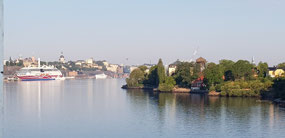
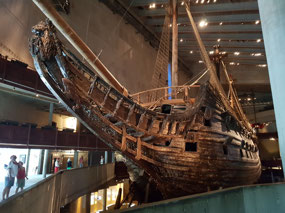
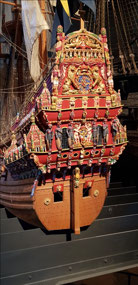
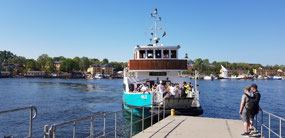
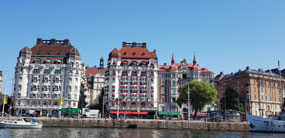
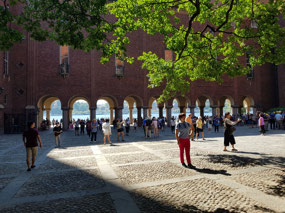
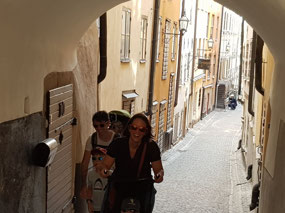
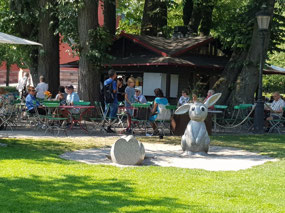










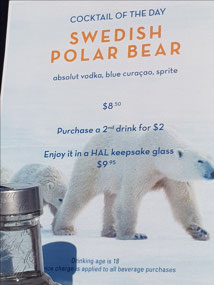
2025-05-22